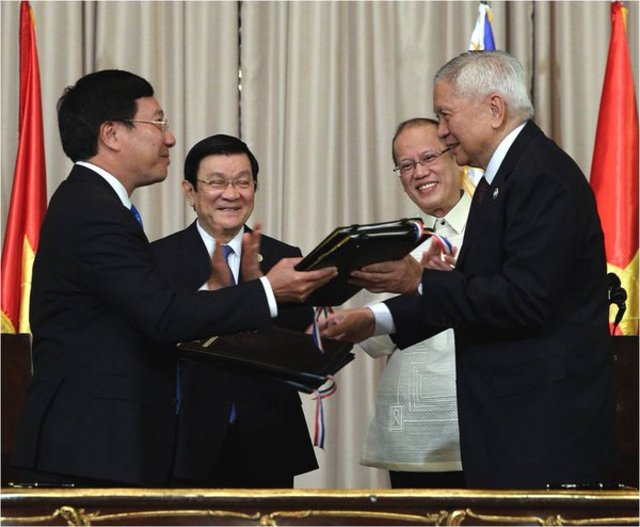On the sidelines of the APEC Summit, the Philippines signs deals with Australia and Vietnam

STRATEGIC PARTNERSHIP. The Philippines signs a strategic partnership with Vietnam, the third deal entered into by the government this year after Japan and Australia. Photo by Official Gazette
Beyond gaining worldwide reputation as this year's host of the Asia-Pacific Economic Cooperation (APEC)
The presence
of Chinese President Xi Jinping did not stop the Philippines
In several
bilateral meetings between President Benigno Aquino III and other leaders,
their top agenda was enhanced defense cooperation, a move widely seen to be
directed at the current maritime disputes in the West Philippine Sea (South China
Sea) involving China and
claimant countries such as the Philippines
There's one agreement though that analysts see as
an important step in defusing tensions over the disputes: the deal signed by Taiwan and the Philippines
On defense deals,
however, it's been a harvest for the Philippines
On Tuesday,
November 17, the Philippines
signed a strategic
partnership with Vietnam
The deal between
the 2 countries aims to promote “strategic partnership on political, economic,
agricultural, defense, maritime, security, judicial and law enforcement
cooperation." Details of the agreement, however, were not given.
The 2 countries
are among the claimants of the South China Sea and have been the most vocal in
their opposition to China
"Mr.
President and I shared our concerns over the recent developments in the East Sea or
the South China Sea , affecting trust, peace,
security and stability in the region. We also reaffirmed the importance of
ensuring the stability, maritime security, safety and freedom of navigation and
of flight in the South China Sea , as well as
settling maritime disputes on the basis of international law including the 1982
United Nations Convention on the Law of the Sea," he said.
The Philippines also signed a “comprehensive
partnership agreement” with its longtime ally Australia
Aquino said the
agreement acknowledges the “increasing breadth and depth” of the 2 countries’
relations.
Palace
Communications Secretary Sonny Coloma said the “strategic partnership” invokes
an “over-arching framework and states general principles.” Both countries will
craft the details of this partnership, he said.
The Philippine
leader and Prime Minister Malcolm Turnbull also "exchanged views on
regional security challenges, including maritime security, and, with this,
committed to continue bilateral consultations on how to address them."
"The Prime
Minister and I committed to continue working closely towards more substantive
and meaningful activities between the Armed Forces of the Philippines
In 2007, the Philippines and Australia
In the case of Japan , the two allies signed in June this year a
Joint Declaration for a Strengthened Strategic Partnership and its Action Plan
during Aquino’s state visit to Japan China
Both countries
stressed that the partnership was meant to "reaffirm their strong
commitment to ensuring maritime safety and security, including in the South China Sea , which is a vital element for peace and
prosperity of the region."
After a meeting
with President Aquino on the sidelines of the APEC Summit, Prime Minister
Shinzo Abe said Japan
“There was a
request from President Aquino regarding the provision of large patrol vessels
to Philippine Coast Guard, and Japan
While Japan does not have a stake in the West
Philippine Sea, it is locked in a dispute with China
over another cluster of islands in the East China Sea .
In June, the Philippines and Japan conducted
military training exercises off the coast of Palawan, a move
criticized by China
Aside from Australia , the country has a long-standing
defense deal with the United
States US
After his meeting
with President Aquino, US President Barack Obama reaffirmed the US ’ “rock solid
commitment” to the defense of the Philippines
The Philippine
Navy will be getting a Hamilton-class cutter from the US Coast
Guard, the yet to be decommissioned CGC Boutwell, which is the same class as
the Philippine warship that Obama visited in Manila on Tuesday, November 17.
The White House
said the ship "will provide the Philippines
The Philippines is crucial in US’ pivot in Asia . Obama expressed hopes EDCA would hurdle the legal
battles in the High Court,
saying the deal would allow Americans to “help treaty partners to build up capacity.”
In October, a US warship sailed in the disputed waters, a move
widely welcomed by other claimant-countries but strongly opposed by Beijing
Other countries,
meanwhile, pledged support and expressed willingness to help the Philippines
Prime Minister
Dmitry Medvedev told Aquino that Russia
While Russia is an ally of China
The Philippines ' longtime ally, the US , meanwhile maintains a safe distance from Russia – except in the fight against
terrorism and ISIS.
The agreement set
out a framework for the conduct of meetings between senior officials and
military representatives, education and training exercises, capacity building,
and information exchange.
Prime Minister John
Key earlier said defense cooperation between Manila
and Wellington
http://www.rappler.com/nation/113401-philippines-defense-deals-south-china-sea-apec-2015

No comments:
Post a Comment
Note: Only a member of this blog may post a comment.